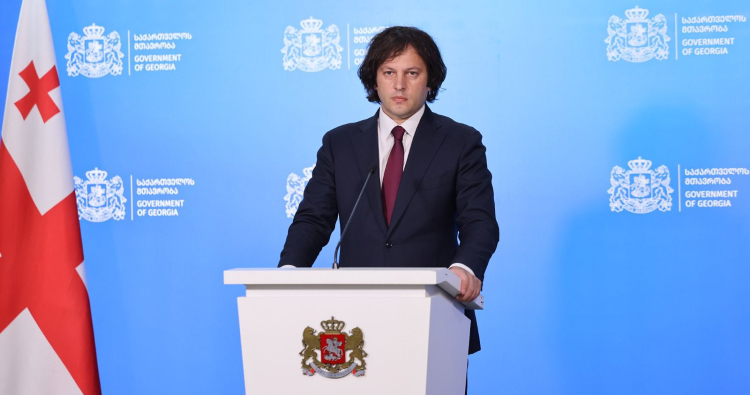Georgian PM highlights economic growth, Govt’s “ambitious plans” to increase pensions, create 200,000 new jobs

He highlighted progress made in poverty reduction, noting the number of individuals living below the poverty line had decreased from 1,120,000 in 2012 to 440,000, with the target to further reduce this figure to a “maximum of 150,000” by 2028. Photo: Government Administration
Georgian Prime Minister Irakli Kobakhidze on Thursday highlighted economic advancements over the past 12 years and announced the Government's future “ambitious plans” to increase pensions, accommodate 6,000 displaced families and create 200,000 new jobs to reduce unemployment.
Kobakhidze emphasised the country's economy had grown from ₾28 billion ($10 bln) to ₾90 billion ($32 bln) over the past 12 years, noting the Government had established a “solid foundation for the continued rapid development”, to ensure the country could reach a “completely different level of development” within the next four years.
During the last four years alone, our economy has grown by ₾40 billion ($14.6 bln). We have an ambitious plan, according to which the economy should grow to ₾130 billion ($47.4 bln). Peace and stable development of the country is necessary for this”, he added.
The PM also mentioned the Government's plans for growing the state budget, which he said had increased from ₾8.5 billion ($3.1 bln) in 2012 to about ₾28 billion ($10.2 bln) this year, with plans to exceed ₾40 billion ($14.6 bln) within four years. He said the growth would enable the implementation of a number of “additional projects to further develop the country”.
The official stated the Government would continue its “ambitious work in all areas”, pledging pensions would be increased annually and 6,000 displaced families would be provided with “decent housing” through ongoing projects, adding this only represented a “small list of plans” his office had in different directions.
When I have to talk about the Government's accounts and plans, I often need to filter out about 90 percent of the proposed plans, highlighting the extensive work being done by each ministry. We will continue to work ambitiously in all directions, including strengthening the Georgian army and supporting police and law enforcement agencies”, he added.
Kobakhidze also said the Government had an “ambitious plan” to create 200,000 new jobs, aiming to reduce unemployment to below four percent and decrease the number of people living below the poverty line.
He highlighted progress made in poverty reduction, noting the number of individuals living below the poverty line had decreased from 1,120,000 in 2012 to 440,000, with the target to further reduce this figure to a “maximum of 150,000” by 2028.
 Tweet
Tweet  Share
Share